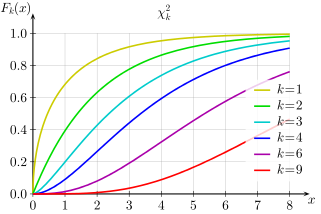|
Probability density function  | |||
|
Cumulative distribution function  | |||
| Notation | or | ||
|---|---|---|---|
| Parameters | (known as "degrees of freedom") | ||
| Support | |||
| CDF | |||
| Mean | |||
| Median | |||
| Mode | |||
| Variance | |||
| Skewness | |||
| Excess kurtosis | |||
| Entropy | |||
| MGF | |||
| CF | [1] | ||
| PGF | |||
In probability theory and statistics, the chi-squared distribution (also chi-square or -distribution) with degrees of freedom is the distribution of a sum of the squares of independent standard normal random variables.
The chi-squared distribution is a special case of the gamma distribution and the univariate Wishart distribution. Specifically if then (where is the shape parameter and the scale parameter of the gamma distribution) and .
The scaled chi-squared distribution is a reparametrization of the gamma distribution and the univariate Wishart distribution. Specifically if then and .
The chi-squared distribution is one of the most widely used probability distributions in inferential statistics, notably in hypothesis testing and in construction of confidence intervals.[2][3][4][5] This distribution is sometimes called the central chi-squared distribution, a special case of the more general noncentral chi-squared distribution.
The chi-squared distribution is used in the common chi-squared tests for goodness of fit of an observed distribution to a theoretical one, the independence of two criteria of classification of qualitative data, and in finding the confidence interval for estimating the population standard deviation of a normal distribution from a sample standard deviation. Many other statistical tests also use this distribution, such as Friedman's analysis of variance by ranks.
- ^ M.A. Sanders. "Characteristic function of the central chi-square distribution" (PDF). Archived from the original (PDF) on 2011-07-15. Retrieved 2009-03-06.
- ^ Abramowitz, Milton; Stegun, Irene Ann, eds. (1983) [June 1964]. "Chapter 26". Handbook of Mathematical Functions with Formulas, Graphs, and Mathematical Tables. Applied Mathematics Series. Vol. 55 (Ninth reprint with additional corrections of tenth original printing with corrections (December 1972); first ed.). Washington D.C.; New York: United States Department of Commerce, National Bureau of Standards; Dover Publications. p. 940. ISBN 978-0-486-61272-0. LCCN 64-60036. MR 0167642. LCCN 65-12253.
- ^ NIST (2006). Engineering Statistics Handbook – Chi-Squared Distribution
- ^ Johnson, N. L.; Kotz, S.; Balakrishnan, N. (1994). "Chi-Square Distributions including Chi and Rayleigh". Continuous Univariate Distributions. Vol. 1 (Second ed.). John Wiley and Sons. pp. 415–493. ISBN 978-0-471-58495-7.
- ^ Mood, Alexander; Graybill, Franklin A.; Boes, Duane C. (1974). Introduction to the Theory of Statistics (Third ed.). McGraw-Hill. pp. 241–246. ISBN 978-0-07-042864-5.


























